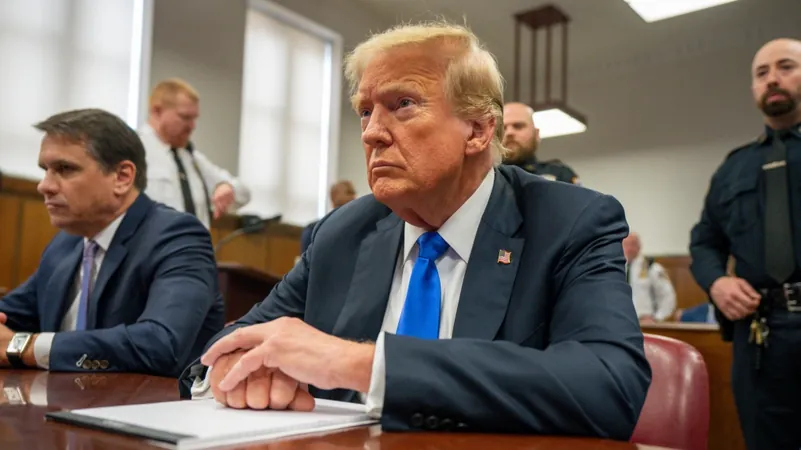
Trump's Upcoming Sentencing: What’s At Stake and What Could Happen Next?
2025-01-06
Author: Amelia
NEW YORK CITY - As the nation approaches an unprecedented moment in its political history, all eyes are fixed on the upcoming sentencing of former and future U.S. President Donald Trump, scheduled for January 10, just days before the anticipated inauguration. The situation presents a unique dilemma for Manhattan Judge Juan M. Merchan, who has expressed a preference for resolving the case with minimal repercussions, potentially allowing Trump to continue his journey back to the White House while carrying a felony conviction.
In a recent ruling, the judge made it clear that Trump could attend the sentencing remotely due to his official duties during the transition. This development underscores the unusual circumstances of the case, as a convicted felon could take office once again, raising significant questions about the implications for American jurisprudence and presidential conduct.
Why is Trump Facing Sentencing?
Trump's legal troubles stem from a conviction in May on 34 felony counts related to business record falsifications tied to a $130,000 payment to adult film actress Stormy Daniels. This transaction was made through Trump’s former attorney to silence her claims of an affair with Trump, which he has vehemently denied. The charges mark a historical first where a former president is criminally convicted, igniting a firestorm of legal debates and political ramifications.
Originally, Trump's sentencing was set for July, but it faced multiple delays at Trump’s lawyers' request, pushing it to after the presidential election. Following Trump's election victory, the case was momentarily put on hold as Judge Merchan deliberated the complexities involved.
What’s Next for Trump?
While Judge Merchan rejected Trump’s motions to dismiss the conviction, he has scheduled a virtual or in-person appearance for the sentencing. The possible outcomes hang in the balance, and the judge has suggested that an "unconditional discharge" – a resolution that wraps up the case without further penalties, yet retains the felony conviction – could be a likely option.
However, it’s critical to note that even if Trump receives an unconditional discharge, he would still be required to submit a DNA sample, as dictated by New York state law for all felony convictions.
Could There Be an Appeal?
The possibility of appealing the sentencing remains murky. Legal experts suggest that while Trump can appeal his conviction at sentencing, the nuances surrounding other legal motions create a complex scenario. Trump's legal team has been proactive in seeking federal court interventions, intending to leverage presidential immunity arguments potentially all the way to the Supreme Court.
They are expected to submit a response to the U.S. 2nd Circuit Court of Appeals shortly after the sentencing date, indicating that the battle over the legality of the case is far from over.
Will Trump Pardon Himself?
A self-pardon scenario remains off the table for Trump regarding his state-level conviction. Presidential pardons are limited to federal offenses, leaving Trump without a safety net should he seek to wipe his slate clean while in office.
As the January 10 date approaches, the legal ramifications and political fallout from Trump's sentencing could dramatically reshape the American landscape. Will history remember this as a pivotal moment in American politics or a mere legal footnote? Stay tuned as the atmosphere thickens with tension and uncertainty.



 Brasil (PT)
Brasil (PT)
 Canada (EN)
Canada (EN)
 Chile (ES)
Chile (ES)
 Česko (CS)
Česko (CS)
 대한민국 (KO)
대한민국 (KO)
 España (ES)
España (ES)
 France (FR)
France (FR)
 Hong Kong (EN)
Hong Kong (EN)
 Italia (IT)
Italia (IT)
 日本 (JA)
日本 (JA)
 Magyarország (HU)
Magyarország (HU)
 Norge (NO)
Norge (NO)
 Polska (PL)
Polska (PL)
 Schweiz (DE)
Schweiz (DE)
 Singapore (EN)
Singapore (EN)
 Sverige (SV)
Sverige (SV)
 Suomi (FI)
Suomi (FI)
 Türkiye (TR)
Türkiye (TR)
 الإمارات العربية المتحدة (AR)
الإمارات العربية المتحدة (AR)